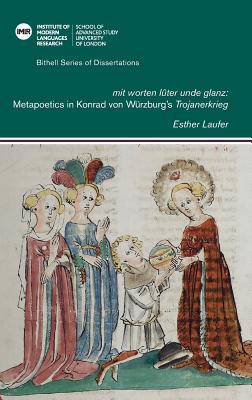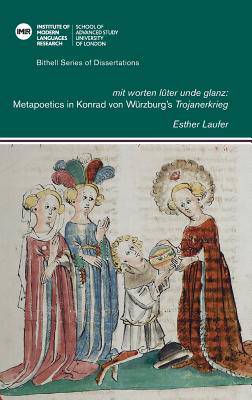
Bedankt voor het vertrouwen het afgelopen jaar! Om jou te bedanken bieden we GRATIS verzending (in België) aan op alles gedurende de hele maand januari.
- Afhalen na 1 uur in een winkel met voorraad
- In januari gratis thuislevering in België
- Ruim aanbod met 7 miljoen producten
Bedankt voor het vertrouwen het afgelopen jaar! Om jou te bedanken bieden we GRATIS verzending (in België) aan op alles gedurende de hele maand januari.
- Afhalen na 1 uur in een winkel met voorraad
- In januari gratis thuislevering in België
- Ruim aanbod met 7 miljoen producten
Zoeken
Mit Worten Lûter Unde Glanz: Metapoetics in Konrad Von Würzburg's Trojanerkrieg
Volume 45
Esther Laufer
€ 27,95
+ 55 punten
Omschrijving
How can you fathom a bottomless abyss? How can you capture ineffable beauty in words? How do you narrate the master of all stories? These are the challenges that seasoned poet Konrad von Würzburg set himself when at the end of the 13th century he composed his account of the Trojan War from a multitude of sources. Konrad has long been recognized as an exceptionally self-conscious author who frequently reflects on the nature, status and function of poetry, and who at times appears more concerned with the sparkling surface of his discourse than with the events he narrates. Taking these observations as a starting point, this study presents the first comprehensive treatment of metapoetics in the Trojanerkrieg. Focusing on traditional and often discussed loci of metapoetic significance, it also uncovers the far-reaching network of explicit and implicit metapoetic expression that permeates the text on every level - even though its multifaceted imagery and arguments resist translation into the language of formal literary theory. The fact that Konrad's metapoetic vocabulary regularly draws on imagery of religious origin offers a new perspective from which to address the controversial question of the Christian author's attitude towards the pagan splendour of the narrated world. In highlighting the pitfalls of metapoetic interpretation and mapping out possible conceptualizations of textuality, language and poetry in Middle High German poetry as well as the relationship between secular and religious literature, this study also makes a broader contribution to medieval literary studies.
Specificaties
Betrokkenen
- Auteur(s):
- Uitgeverij:
Inhoud
- Aantal bladzijden:
- 310
- Taal:
- Engels
- Reeks:
Eigenschappen
- Productcode (EAN):
- 9780854572533
- Verschijningsdatum:
- 25/11/2016
- Uitvoering:
- Hardcover
- Formaat:
- Genaaid
- Afmetingen:
- 156 mm x 234 mm
- Gewicht:
- 612 g

Alleen bij Standaard Boekhandel
+ 55 punten op je klantenkaart van Standaard Boekhandel
Beoordelingen
We publiceren alleen reviews die voldoen aan de voorwaarden voor reviews. Bekijk onze voorwaarden voor reviews.









